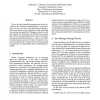45 search results - page 2 / 9 » A two-phase escape analysis for parallel java programs |
SIGSOFT
2008
ACM
14 years 5 months ago
2008
ACM
Framework-intensive applications (e.g., Web applications) heavily use temporary data structures, often resulting in performance bottlenecks. This paper presents an optimized blend...
CC
2004
Springer
13 years 10 months ago
2004
Springer
In this paper, we show how previous work on escape analysis can be adapted and extended to yield a static analysis that is efficient yet effective for reducing the number of inter...
ACPC
1999
Springer
13 years 9 months ago
1999
Springer
IJNSEC
2007
13 years 4 months ago
2007
Java programs can be transmitted and executed on another host in bytecode format, thus the sensitive information of the host may be leaked via these assembly-like programs. Inform...
CLUSTER
2003
IEEE
13 years 10 months ago
2003
IEEE
The use of Java for parallel programming on clusters according to the message-passing paradigm is an attractive choice. In this case, the overall application performance will larg...

